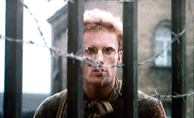Landscape After the Battle opens to the narratively silent symphony of a concentration camp liberation, as haggard yet jubilant prisoners run out into the snow-covered open field, break the windows of the internment barracks, impulsively undress and toss their degrading uniforms onto a blazing bonfire, and rejoice at the arrival of the Allied soldiers. A pragmatic and mild-mannered intellectual named Tadeusz (Daniel Olbrychski) distractedly observes the spectacle, and struggles to retrieve his precious, hoarded books that have been trampled during the chaos. But beyond the constant traffic of liberated prisoners relocated from the camp and a broadcast declaration of freedom by a sympathetic, but culturally naive American supervising officer, little seems to have changed in the austere lives of the prisoners. Unable to return to their war ravaged and politically unsettled homeland, the survivors are indefinitely resettled into temporary housing behind the patrolled gates and reinforced security fences of holding camps scattered throughout Germany. Tadeusz reflects off camera, “The war had ended and the year 1945 passed while we were kept behind barbed wire. The victors feared these people and guarded them closely so that they wouldn’t misuse their freedom.” Deeply scarred by the atrocities of war and facing an uncertain future away from an increasingly elusive and distant homeland, the prisoners are reduced to selfish, destructive, and immoral behavior: indulging in excessive drinking, bartering limited food rations in order to curry personal favors, seducing (and at times, exploiting) the vulnerable women transported to the camps. Among the resettled prisoners is a stoic, disillusioned survivor named Nina (Stanislawa Celinska) who finds kinship with the introspective Tadeusz. But as the protagonists struggle to reconcile with their profound loss and emotional inertia, can love and humanity survive in the restricted freedom and uncertain landscape of postwar Poland?
Based on the stories, Battle of Grunwald and This Way for the Gas, Ladies and Gentlemen, by writer and concentration camp survivor Tadeusz Borowski, Landscape After the Battle is a poignant, caustic, and resigned portrait of despair, cultural estrangement, and alienation of Poland’s postwar generation. Using recurrent images of confinement, encircling camerawork, and incongruous and unusual imagery, Andrzej Wajda reflects the pervasive sense of inertia, anguish, and pessimism of a displaced generation compelled to live in extended exile as their nation struggles to rebuild under the turbulent and uncertain era of a Russian controlled, newly communist Poland: the forbidding barbed wire fences, gated walls, and trenches of the German resettlement camp; the lifeless and surreal reenactment of the patriotic Battle of Grunwald; the emotionally conflicted shot of a church memorial wall dedicated to German military casualties; Tadeusz’ alternating hesitant and aroused observation of a young German woman in church. Through repeated patterns of inhumanity, degradation, and barbarism, Wajda provides an incisive commentary and a cautionary tale for the suppression of personal freedom and the propagation of a destructive ideology that rationalizes the practice of internment in the distrustful atmosphere of the Cold War – Poland’s figurative landscape after the battle – an alien and oppressive environment of demoralization, human cruelty, and moral decay.
© Acquarello 2002. All rights reserved.
